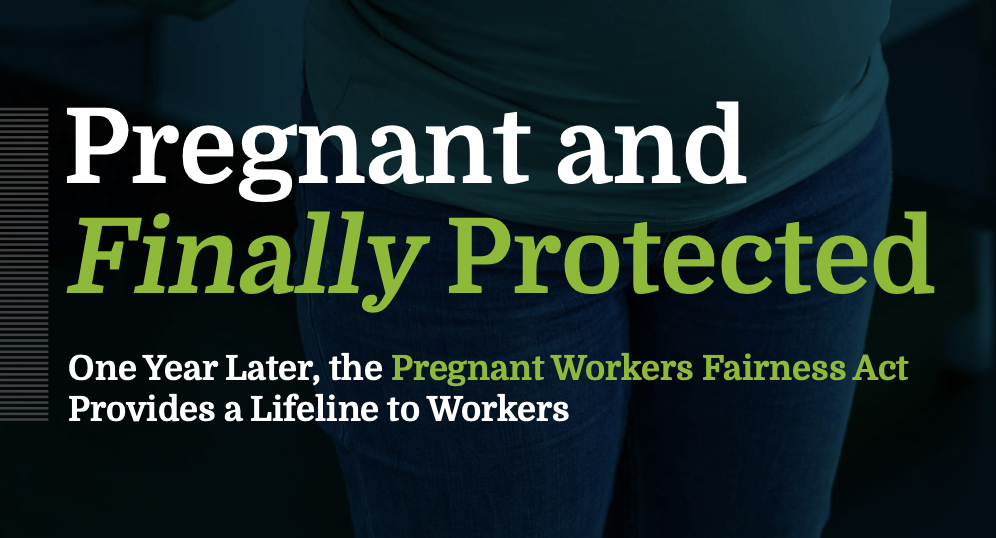One year ago, on June 27, 2023, the federal Pregnant Workers Fairness Act (PWFA) went into effect, bringing long overdue protections to millions of workers affected by pregnancy, childbirth, and related conditions. Because of the Pregnant Workers Fairness Act, pregnant and postpartum workers can no longer be forced off the job and denied the temporary accommodations they need to stay healthy and attached to the workforce.
Today, national work-family legal advocacy organization A Better Balance, which launched and led the ten-year movement for the Pregnant Workers Fairness Act, released a report, “Pregnant and Finally Protected,” which provides in-depth analysis of the impact the PWFA has had over the last year. Through its free, confidential work-family legal helpline, A Better Balance has directly assisted nearly 500 workers in understanding and exercising their rights under the PWFA since the law took effect. In the report, the organization provides a portrait of how this law is already making a world of difference for the health and economic security of individuals and their families.
“As the experiences of workers we have assisted via our legal helpline show, the Pregnant Workers Fairness Act is already providing long overdue dignity, equality, and justice for workers who are pregnant or recovering from childbirth, so they are no longer forced to risk their health, or sacrifice their income when they need it most,” says A Better Balance Co-President Dina Bakst. “With additional education, enforcement, and clarity as the EEOC’s regulations take effect, we are confident that pregnant and postpartum workers will be even more protected and empowered to access the vital accommodations they need and deserve under the law, once and for all.”
Workers’ stories highlighted in the report include those of:
Victoria, a pregnant custodial worker in South Carolina, who provided her doctor with a note outlining several pregnancy related restrictions, including limiting heavy lifting, limiting climbing stairs, and a need for additional breaks. Her employer informed her that she couldn’t return to work until her restrictions were lifted and later forced her onto unpaid leave. After calling A Better Balance’s helpline, she used our resources to inform her employer of their obligations. Her employer reversed their decision and she returned to her shift the following day.
Maxine, a medical assistant in Washington, DC, who was advised that she must resign from her position after giving birth because she wasn’t eligible for the Family and Medical Leave Act (FMLA). After she advocated for her rights under the PWFA by sharing resources from A Better Balance, her employer changed their tune and told her they would be happy to welcome her back after she recovered from childbirth.
Raquel, a worker for a major telecommunications company in Ohio, who, like many mothers, developed severe postpartum mental health conditions after giving birth to her daughter. Her doctor recommended that she temporarily work from home to make her transition back to work more manageable. Despite her employer initially trying to say that her union contract conflicted with the PWFA, after contacting A Better Balance’s helpline, she was able to return to her employer and show that this was not the case, and receive the accommodation she needed to return to work.
Cristel, an electrician’s assistant in New York City, who, in a male-dominated, physically-demanding role, expected and feared that she would face discrimination while pregnant. Sure enough, her employer immediately tried to force her onto leave when she presented a doctor’s note saying she must limit heavy lifting. But, with support from A Better Balance, she was able to advocate for herself, and her employer suddenly exhibited increased flexibility and provided the accommodations she needed.
As the report concludes, it is clear that for many workers, the Pregnant Workers Fairness Act has been a lifeline to protecting their health or their paychecks. For others, the law empowered them and made them feel like they deserved accommodations to protect their health or economic security—showcasing the beginnings of a cultural shift, where pregnancy discrimination in all its forms will no longer be tolerated in American workplaces.
At the same time, the report also highlights some common challenges that some workers have faced in accessing the accommodations they are entitled to, like delays in response to their requests, or being required to secure onerous medical documentation. The report emphasizes the vital importance of outreach, education, enforcement, and the new regulations in ensuring workers know how to use the law to overcome these challenges. It also addresses the implications of recent court rulings regarding the Pregnant Workers Fairness Act.
Final regulations for the PWFA from the Equal Employment Opportunity Commission (EEOC) go into effect today, June 18. In addition to the release of “Pregnant and Finally Protected,” A Better Balance has also released a new FAQ resource, which can be used by workers and advocates in understanding the full, groundbreaking scope of the Pregnant Workers Fairness Act.





